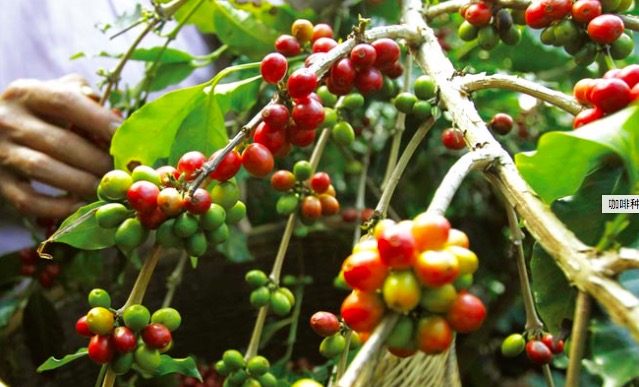In order to win the top coffee market in Europe, the United States and Japan, Ugandan coffee is not good enough to go to prison.

Uganda does not hesitate to put illegal farmers in jail in order to improve the quality of coffee beans, but experts believe that this can only be achieved by introducing farming programs, education and other incentives.
■ Farming projects, education and other incentives should be used to boost coffee quality rather than arrests.
Coffee beans are an important export commodity of Uganda, but the quantity and amount of coffee bean exports have declined due to the decline in commodities in recent years. In order to improve the quality of coffee beans to increase exports, the Ugandan government has introduced strict guidelines to maintain quality, and farmers may even be sent to jail if they break the rules.
Ugandan coffee farmer Richard Mutebi was drying coffee beans by the side of the road in his backyard in June but was arrested by the police for several days in prison on the grounds that he had spread the coffee beans on the road without putting on a plastic tarpaulin.
Uganda is a major exporter of coffee in Africa. In order to improve the quality and volume of coffee beans in order to earn more valuable exporters, the government continues to introduce stringent measures to achieve the goal.
According to the Uganda Coffee Development Authority (UCDA), its exports of coffee beans in June were 260000 6337 bales (weighing 1 kg each), down from 280000 5945 bales in May, so that the profit earned from coffee beans exported in June fell to 26.5 million US dollars from 27.6 million US dollars in May.
Coffee exports account for 25% of foreign trade.
Apollo Kamugisha, a UCDA technician, said that coffee is a commodity whose quality is easily affected, and coffee farmers must follow the guidelines to maintain quality. At present, all the police have been ordered to arrest coffee farmers who do not abide by the rules.
The majority of the Ugandan population drinks tea rather than coffee and sells coffee overseas as much as possible to earn extra money.
1/4 of Uganda's foreign currency exports come from coffee exports. Last year, the Ugandan currency shilling depreciated by about 20% against the dollar, increasing the importance of foreign currency to the Ugandan economy. The shilling / dollar rate has been flat this year, in part due to the rise in coffee prices.
The Ugandan government has resorted to punitive measures to force farmers to follow the guidelines, not only to improve the quality of coffee exports to increase foreign trade, but also, like other African countries, to cut into the more profitable global boutique coffee market.
According to data in June, only 64,955 bales of Arabica beans of good quality and high price were exported from Uganda, far less than 200000 1381 bales of Robasta beans of lower quality and price.
Quality should be improved by education and reward
According to the USDA, more than half of the world's coffee beans are produced in Brazil and Vietnam, and Africa accounts for only about 11% of the world's coffee bean production.
Although Africa cannot compete with Brazil and Vietnam in terms of output, coffee producers from Ethiopia to Tanzania are targeting high-end markets in the United States, Japan and Europe. Because the price of high-quality coffee beans is several times the benchmark price of coffee.
In Ethiopia, for example, in order to win the top coffee market in Europe, the United States and Japan, severe penalties such as increased prison sentences or heavy fines were offered to coffee farmers who failed to meet the quality requirements and exporters who failed to export the highest quality coffee beans.
Although Uganda wants to follow Ethiopia's example, this tough measure undermines the relationship between the government and small coffee farmers. David Muwonge, vice president of Uganda's National Coffee Agriculture and farming Association (NUCAFE), criticized the government for blaming farmers for quality problems.
Timothy Schilling, chief executive of the World Coffee Institute (WCR), said that if the government wants to improve the quality of coffee, it should introduce more farming programs, education and incentives, rather than putting farmers in jail.
Mutibi, 38, who was taken to prison, was dissatisfied with the government's tough approach. He said that he had lived a difficult life for many years and did not have enough money to buy waterproof tape, but the government did not provide any help.
However, the Ugandan government's adherence to its strict regulatory measures is good for the long-term development of the coffee industry, farmers' income and the national economy. The central bank of Uganda announced that gross domestic product (GDP) grew by only 4.5% in the fiscal year from July last year to June this year, the slowest increase in five years, dragged down by falling commodity prices. As a result, the Government of Uganda is more reluctant to relax controls.

Important Notice :
前街咖啡 FrontStreet Coffee has moved to new addredd:
FrontStreet Coffee Address: 315,Donghua East Road,GuangZhou
Tel:020 38364473
- Prev

How many APP do you have in your phone that are suitable for baristas?
Mobile phones are so popular, for baristas, it would be too out if they were just used to browse moments and post their status. Want to record and analyze cup test scores? The next APP; want to make sure the extraction time is not too short or too long? The next APP; want to keep track of your recipes and ideas? You know. 1.Instagram Instagram as a global picture social sharing platform
- Next

Expose Kopi Luwak industry chain: civets are abused, mostly get sick and die.
Core tip: wild civets use coffee beans as part of a balanced diet, while captive civets are overfed with immature coffee beans and locked up in the claustrophobic Rizhao Space reference News Network on July 26th, US media reported on July 26th that the world's most expensive cup of coffee can be sold for $100 (about 668 yuan), but the production of this kind of coffee is hidden.
Related
- What is the difference between Indonesian Sumatra Mantinin coffee and gold Mantinin? How to distinguish between real and fake golden Mantelin coffee?
- What does bypass mean in coffee? Why can hand-brewed coffee and water make it better?
- Unexpected! Ruixing Telunsu lattes use a smoothie machine to foam milk?!
- % Arabia's first store in Henan opens into the village?! Netizen: Thought it was P's
- Does an authentic standard mocha coffee recipe use chocolate sauce or powder? Mocha Latte/Dirty Coffee/Salty Mocha Coffee Recipe Share!
- What is the difference between Vietnam egg coffee and Norway egg coffee? Hand-brewed single product coffee filter paper filter cloth filter flat solution!
- What is the difference between sun-cured and honey-treated coffee? What are the differences in the flavor characteristics of sun-honey coffee?
- How to make Italian latte! How much milk does a standard latte use/what should the ratio of coffee to milk be?
- How to make butter American/butter latte/butter Dirty coffee? Is hand-brewed coffee good with butter?
- Is Dirty the cold version of Australian White? What is the difference between dirty coffee/decent coffee and Australian white espresso?

